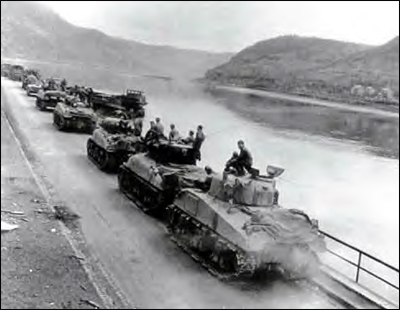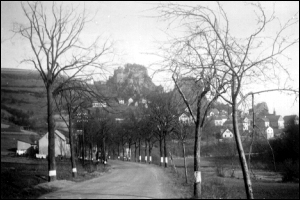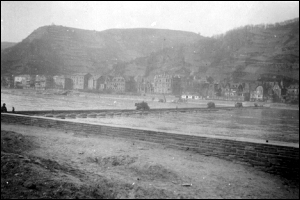 |
The Rhine Crossing (Our Biggest Battle)

March 24 marked the beginning of the Division's second and most impressive combat phase. The excitement, intensity, movement and anxiety increased, at least for me. New units were attached to the Division for the crossing such as mobile anti-craft guns, heavy artillery, combat engineers, etc. Equipment was arriving, such as pontoons and treadways and even the US Navy showed up with assault boats. We were part of a major campaign involving the last major impediment to capture of the heartland of Germany. Service Battery of the 563rd was only a small unit in the impressive logistical support mounted for crossing the mighty Rhine but it gave us great satisfaction to be involved. The history of this crossing is amply described in the Division's official history and its website.
For me, as with previous river crossings, it began by transporting infantrymen and their equipment to their embarkation assembly points. In addition to our own four artillery battalions, 15 additional battalions from Corps were supplied, a formidable array of firepower. Unfortunately, it seems some bright staff or higher command officer decided our attack would be a surprise one, taken at night and without forewarning, meaning no artillery support. It was another case of digging trench ditches at Lucky Strike after the fly was out of the coup. Many 89ers that were wounded or lost buddies crossing the Rhine and climbing the hills on the other side remain bitter to this day over what seemed to them to be a tactical blunder.
 |
Tanks of the 89th at Kaub, preparing to cross the Rhine
|
We crossed from Oberwesel, just below S. Goar where the main crossing took place. St Goarhausen was the main objective. It is a muddle of confusion in my memory. Of course, with our artillery and trucks we had to wait until the Engineers built a pontoon bridge across the Rhine, which wasn't long coming.
We crossed from Oberwesel, just below St. Goar where the main crossing took place. St. Goarshausen was the main objective. It is a muddle of confusion in my memory. Of course, with our artillery and trucks we had to wait until the Engineers built a pontoon bridge across the Rhine, which wasn't long coming.
As we crossed, I remember how much the houses in the small villages on the Rhine reminded me of scenes from Walt Disney cartoons. By the end of the month, we had cleared the whole area. Our battalion then traveled down river going through Wiesbaden, which, unlike other cities we had seen, was still largely intact because of its status as a hospital center. We came to a halt in the country outside the city about April 1 and spent the night in a field mostly surrounded by thick woods. Since we were halted for the night, some of more enterprising truck drivers removed the thick tarpaulin from their trucks to make a tent-like structure that was lightproof, permitting one to read and write letters. When going on guard that night, we had been warned to watch out for armed German stragglers seeking to return to their units through under cover of the woods and darkness.
 | |  |
| |
|
In the late afternoon, a supply truck stopped at our encampment with an unexpected and pleasant surprise. It seems our Division had liberated a supply of French champagne, which the Germans had previously looted from France, and every man was "issued" a bottle. Wilkie and I were scheduled to go on guard duty at about 10:00 p.m. After supper, we retired to our truck and each proceeded to drink his bottle in its entirety. Neither of us was seasoned drinkers or use to the strange feelings the "bubbly" liquid could cause. It is no surprise then that when we jumped off our truck's tailgate to go on guard, we were feeling no pain. With what happened next, I was probably as close or closer to death than anytime in combat. There was a first-generation Italian boy from New York in our Battery, a real nice guy, but who fit the stereotype of a Brooklynite, accent, looks and all, to a "T". As such, even I, a Brooklynite myself, often teased him. Unfortunately, I forget his name. In 1939, when in high school, it seemed very clear to me that the United States would eventually go to war with Nazi Germany so I elected to study German for two years on the sound, it turned out, theory that I would be there too. My German-speaking capabilities were obviously not great, and it never made any contribution to the war effort, but when your buddies speak none, it gave you significant advantages with certain parties, which I will elucidate a bit later. Anyway, as we patrolled the perimeter I could see candlelight coming from a fold in his tarp. I said to Wilkie "Watch me scare the pants off him" and shouted out in German for him to come out with his hands up. Well this "buddy" didn't speak any German but recognized when it was being spoken and his reaction was immediate and completely unexpected, to say the least. Without a moment's hesitation, he picked up his carbine and fired blindly at the direction of my voice. While I don't recommend it, it is the fastest sobering up technique imaginable. He was not a happy man. The next worry was that, having certainly awakened the First Sergeant and Corporal of the Guard, we would shortly get chewed out or worse. Strangely, not a single person moved to investigate. After all, those bad Germans were out in them there woods minding their own business. Whatever, I learned a good lesson there.
<< Moselle Crossing |
Racing Eastward >>
|
 |




